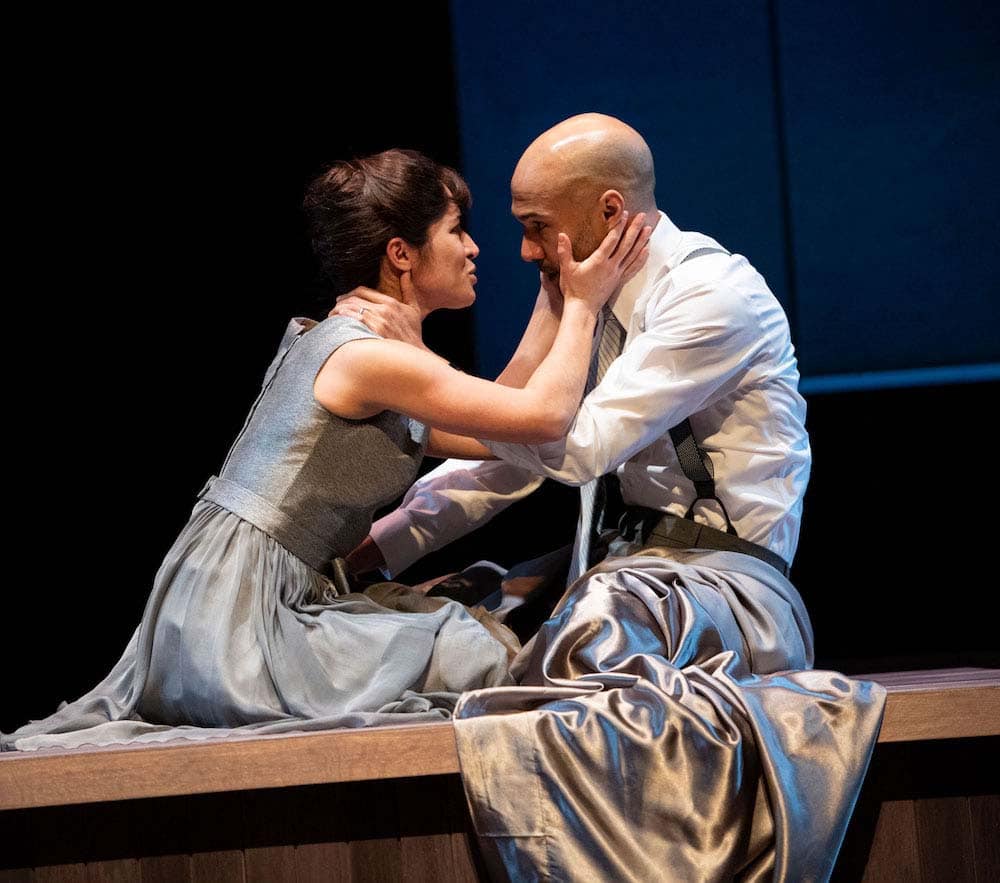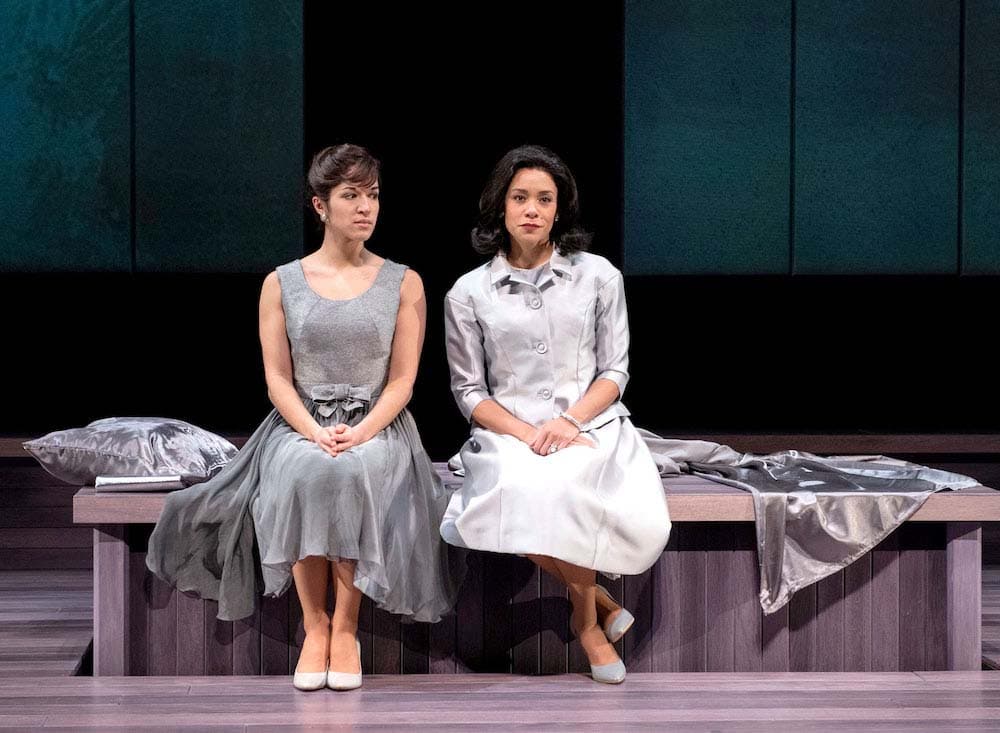Change Agent, a world premiere written and directed by Craig Lucas as part of Arena Stage’s Power Plays series, asks the audience to take seriously the proposition that an affair between John F. Kennedy and Mary Pinchot Meyer powerfully influenced major policies of his administration. The play imagines Meyer being a persuasive President-whisperer whose idealism is crucial in nudging Kennedy to ease tensions with the Soviet Union, integrate the Secret Service, and support a civil rights bill. It’s a big ask.

While not a household name, Mary Meyer is the subject of biographies, novels, numerous newspaper and magazine articles, and a true-crime podcast, many of which focus on her suspicious, and unsolved, 1964 murder. Meyer (Andrea Abello) lived in Georgetown when it was the center of the Washington political universe. Her husband, Cord Meyer (Jeffrey Omura), headed the CIA’s “soft power” operation, which suborned or coerced writers, newspapers, magazines, filmmakers, and student organizations to tell a favorable story about the U.S. during the Cold War. She was Ben Bradlee’s sister-in-law. She lived next door in McLean to Jack (Luis Vega) and Jackie (Kathryn Tkel) Kennedy. Mary was becoming recognized as a real talent in the contemporary art scene.

The center of the play is her relationship with Kennedy. A longtime friend of the Kennedys, Mary is, in Lucas’s vision, pursued for decades by the skirt-chasing JFK, resisting his entreaties until after her divorce from Cord and Kennedy’s election. Their relationship reportedly involved greater emotional and intellectual intimacy than most of Kennedy’s dalliances. The play raises, but does not interrogate, the possibility that Mary’s participation in the affair was a considered effort on her part to use privileged access to influence policy.
In the performance, the tone of her relationship with Kennedy is portrayed as more maternal than passionate, with Vega’s Kennedy often seeming a lost boy needing comfort in Mary’s arms, perhaps becoming a subconscious surrogate for Mary’s own lost son, killed by a car some years earlier. An acquaintance of LSD guru Timothy Leary, Lucas’s Mary introduces Kennedy to the substance. In the play’s most preposterous scene, she takes Kennedy on an acid trip that somehow clinches his support for a civil rights bill.
A positive development in theater, at least since Hamilton, is that it’s no longer thought necessary to match actors with the look or ethnicity of historical characters. Lucas and Vega, probably wisely, make no attempt at an impersonation of the historical Kennedy’s appearance or style, but there is also little to connect the character with the charismatic public Kennedy. It is hard to imagine this Kennedy succeeding in electoral politics.
Lucas gives Abello the thankless job of playing a character written with a minimal character arc. She does so attractively and energetically but is compelled to be unremittingly smart, committed, and self-possessed, never failing to give peace a chance. In appearance and action, she is little different as a teenager than as a 40-year-old.

Cord readily sheds his initial postwar desire for world government, buying into the Manichean spirit of the Cold War for reasons he explains to Mary in a well-written first act monologue. Omura takes the popular picture of a tight-lipped intelligence operative to another level. Seldom has such a consistently clenched mouth been seen on local stages. Cord and his offstage colleagues Allen Dulles (long the CIA director) and James Jesus Angleton (head of counterintelligence, best known for his long, futile pursuit of a CIA mole who may not have existed) are the clear villains of the piece, manipulating the world from behind the scenes for the sake of their own power.
Two supporting characters provide the show’s best performances. Tkel’s Jackie is tough, cynical, and knowing, but ultimately compassionate. Regan Linton is superb as Cicely, Angleton’s wife. The most grounded character in the play, Cicely often seems the only adult in the room.
The technical production fared well. Catie Hevner’s varied projections onto the upstage panels of Wilson Chin’s set — a view of Georgetown in a snowstorm and an aqueous evocation of Kennedy’s LSD experience were especially nice — were effective. Titles establishing and identifying times and locales were helpfully projected onto a part of a trapezoidal structure hung over the stage. A notable feature of Cha See’s lighting design was low-set instruments projecting large shadows of the actors onto the set. Alejo Vietti’s costumes for Mary are beautifully constructed and flowing.
In the second act, Lucas plunges headlong into a wilderness of deep-state conspiracy theories, blaming the CIA in general — and the Cord Meyer, Dulles, and Angleton triumvirate in particular — for the Kennedy assassination, Oswald’s murder, Mary’s murder, keeping presidents in the dark about coups, and killings of numerous leaders and activists then and later.
The characters sometimes talk straight out to the audience, providing exposition from “the afterlife.” This can be a workable device, as Michael Frayn’s brilliant Copenhagen shows, but here contributes to the play’s sometimes cool detached feeling. A preachy group speech to the audience at the end of the show brings matters to an awkward conclusion.
Power Plays, writes Arena Artistic Director Molly Smith in her program note, aim at showing America “at its best and worst through historical characters and stories, but not necessarily as direct recreations of actual events.” That’s a worthy objective, but the earnest Change Agent makes a disappointing contribution to the series.
Running Time: Two hours 20 minutes, including one intermission.
Change Agent plays through March 6, 2022, in the Kogold Cradle at Arena Stage at the Mead Center for American Theater, 1101 6th Street SW, Washington DC. Purchase tickets ($40–$95) online, by phone at 202-488-3300, or at the Sales Office at 1101 Sixth
Street SW, DC. The Sales Office is open Tuesday – Sunday, 12:00-8:00 p.m. for phone purchases and beginning 90 minutes prior to each performance until curtain for in-person purchases. For information on savings programs such as pay-your-age tickets, student discounts, Southwest Nights, and hero’s discounts, visit arenastage.org/tickets/savings-programs.
COVID Safety: Proof of vaccination and photo identification must be shown to enter the building and masks must be worn inside. Arena Stage’s complete COVID safety policies and protocols are here.





“Pillow Talk”. “Preposterous”. “Preachy”. “Abello…is compelled to {play a character} unremittingly smart, committed and self-possessed.” The misogyny in this so-called review is blatant and these are just a few examples of Mr. Ashby’s baggage that seems to be more about his own prejudices and less about the great play he is supposedly critiquing. I saw “Change Agent” with a packed house of fellow theatre lovers. There was much genuine laughter at the absurdities of political venality and a concentrated silence, “you could hear a pin drop” kind of quiet as we all absorbed the riveting, frightening and compassionate portrait of a woman determined to speak truth to power and work for the common good. As for conspiracy theories, the playwright addresses the futility of conspiracies multiple times as Mary says toward the end of the show, paraphrasing her, “blame won’t do us any good. We must do away with this ‘us and them’ rhetoric.” Did Mr. Ashby pay any attention at all? His byline says that he is a retired government lawyer…perhaps Mary’s story hit a bit too close to home for Mr. Ashby’s comfort. Doth he protest too much? “Change Agent” reminded me of Toni Morrison’s speech to students at Howard University. I leave these words as a reminder to Mr. Ashby what our true battle is and what “Change Agent” depicts so eloquently.
Let us be reminded that before there is a final solution, there must be a first solution, a second one, even a third. The move toward a final solution is not a jump. It takes one step, then another, then another. Something, perhaps, like this:
Construct an internal enemy, as both focus and diversion.
Isolate and demonize that enemy by unleashing and protecting the utterance of overt and coded name-calling and verbal abuse. Employ ad hominem attacks as legitimate charges against that enemy.
Enlist and create sources and distributors of information who are willing to reinforce the demonizing process because it is profitable, because it grants power, and because it works.
Palisade all art forms; monitor, discredit, or expel those that challenge or destabilize processes of demonization and deification.
Subvert and malign all representatives of and sympathizers with this constructed enemy.
Solicit, from among the enemy, collaborators who agree with and can sanitize the dispossession process.
Pathologize the enemy in scholarly and popular mediums; recycle, for example, scientific racism and the myths of racial superiority in order to naturalize the pathology.
Criminalize the enemy. Then prepare, budget for, and rationalize the building of holding arenas for the enemy—especially its males and absolutely its children.
Reward mindlessness and apathy with monumentalized entertainments and with little pleasures, tiny seductions: a few minutes on television, a few lines in the press, a little pseudo-success, the illusion of power and influence; a little fun, a little style, a little consequence.
Maintain, at all costs, silence.
“Pathologize the enemy in…popular mediums.” Exactly what part of Cord’s project is with regard to the media and exactly what Mr. Ashby seems to be doing here, shooting the messenger to protect his own biases. “Change Agent” is suffused with the spiritual watchcry: Love Thy Neighbor As Thyself. Something it appears Mr. Ashby considers naive; exactly what misogynists throughout history have called women who dare to step foot in the patriarchy’s political sandbox. Interesting that the play centers around another Mary, another mother trying desperately to get us all to stop and listen. I am so thankful for this play. “Change Agent” presents a complicated portrait of a woman whose contributions to our country have been erased by the powers that be, a woman who, like many of us — mothers, daughters, entrepreneurs, Senators, judges, mechanics, factory workers, healthcare professionals, truck drivers, etc. — is unremittingly smart, committed and self-possessed. In other words, an adult with moral courage. Thank God.